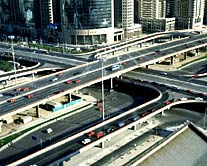The Chinese capital, facing an ever-serious traffic problem, is
building an express road network to connect the current four ring
roads to ease the city's traffic woes.
According to Zhou Zhengyu, deputy director of the Beijing
Transportation Committee, the city will have 15 such thoroughfares
in place - with no traffic lights - by 2006. They will link the
fifth, fourth and third ring roads down through the urban second
ring road.
Zhou said, so far, 80 per cent of the 280 kilometers of express
roads have been completed and another 38.6 kilometers of roads will
be finished by next year.
The city's traffic map so far has linked four completed ring roads
like growth rings on a tree, but there are not enough feeder roads
yet to connect the outer rings to the downtown area.
Zhou said his committee will team up with other departments to
improve the traffic management system to carry out other
traffic-mitigating measures, including charging more for parking.
Paying more to park may keep motorists from using their cars.
Liu Xiaoming, another deputy director of the transportation
committee, said the city is expected to invest 35 billion yuan
(US$4.2 billion) next year to better its traffic situation.
Besides the construction of express roads, Liu said a public
transit network and a special bus line would extend 130 kilometers
next year.
In another development in Guangzhou, capital of south China's
Guangdong Province, officials have decided to construct a new
modern railway station in the Panyu District, hoping the facility
will become a new railway transit hub and fortify its status as a
logistics center in the country.
The total investment for the new railway station will come to
between 4.1 billion yuan (US$494 million) and 5.1 billion yuan
(US$614 million), which will make it the most modern and largest
passenger railway station in Asia, according to Du Wen, director of
the Preparation Committee of Guangzhou New Railway Station.
 |
And Guangzhou, in the core of the Pearl River Delta, together with
Shanghai, Beijing and Wuhan, will become one of the four largest
railway passenger transportation hubs in 2020 when the new station
starts services, Du said.
Guangzhou Railway Station, which lies in Guangzhou's busy Yuexiu
District, will be closed and all its passenger train services will
be moved to the new railway station in the future.
The railway could have trains that reach speeds of more than 300
kilometers an hour in upcoming years, Du said.
Guangzhou municipal government has decided to open multichannels to
raise the large sums needed for construction, Du said.
(China Daily November 17, 2003)